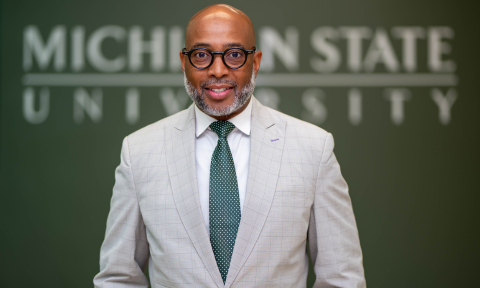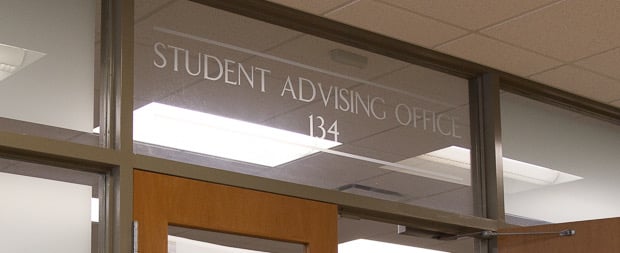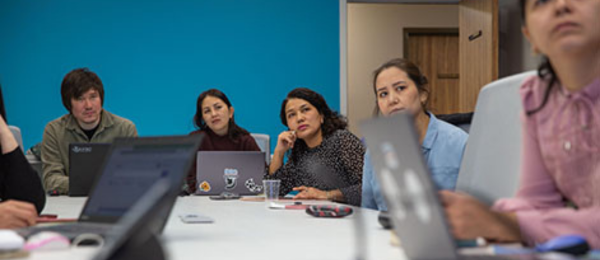Supporting Educators’ Political Efficacy Via the EPLP, AEPLP, and MSU-BMEA Policy Modules
Structurally, the United States’ political system is showing signs of fragility as “debate has been replaced by the assertion of immutable positions and the assumption of bad faith by the other side,” polarization has driven “less empathy, less appreciation of the other’s point of view, and less understanding,” and “political identity [has become] a social identity” (Carnegie Reporter). Emblematically, “a record-high 80% of U.S. adults believe Americans are greatly divided on the most important values, while [only] 18% believe the country is united” (Gallup). Concerningly, such enmity and hostility have delivered deeply troubling political violence (e.g., the assassination of Charlie Kirk, attacks against Minnesota state lawmakers, attempts on President Trump’s life, and the 2021 “insurrection at the U.S. Capitol”). Additionally, polarization has driven some constituents to “simply [withdraw] from politics” (ICIP). For instance, recent research found that “up to 5.7 million additional votes may have been cast in the 2024 general election if voter confidence levels had been higher” (States United Democracy Center). With that, “young people’s electoral participation dropped slightly in 2024,” with political scientists blaming prospective voters not “think[ing] it was important,” not “lik[ing] the candidates,” and “lacking the necessary information or support to vote” (CIRCLE – Tufts University – Tisch College).
As a microcosm of society, the classroom has been increasingly affected by these alarming trends. For example, an opinion piece described how post-pandemic, “the national culture wars seeped into [school] hallways,” “tensions rose, board meetings got heated, and the job of ‘just teaching’ became a political tightrope.” Beyond disrupting educators’ ability to deliver high-quality instruction, some voices have warned that “more teachers than ever are leaving...because of” these political intrusions (We Are Teachers; EdSurge). Worried about this national political picture and the myriad of ways it is hindering teachers, administrators, and education professionals’ ability to support their students, the Office of K-12 Outreach tripled down on its efforts to support education leaders’ political knowledge, capacity to effectuate change, ability to develop alliances and coalitions to bring about reforms, and willingness to immerse themselves in this messy system. To start the 2025-26 school year, this effort has included the launch of the 51st Michigan Education Policy Fellowship Program (EPFP) cohort, which is being rebranded as the Michigan Education Policy Leadership Program (EPLP) to emphasize its focus on strategic leadership and align our site with peers in GA, KS-MO, MA, MN, MS, NC, NY, OH, and PA. Additionally, this commitment to supporting education leaders' political efficacy has included two new programs – participation in the Advanced Education Policy Leadership Program (AEPLP) for EPFP/EPLP alums and support of the BMEA (Boldly Moving Education Ahead) Principal Wellness & Policy Fellowship via a series of MSU-BMEA Policy Modules.
The crown jewel of K-12 Outreach's effort to support education professionals' political awareness, engagement, and advocacy is the Michigan Education Policy Leadership Program (EPLP). Over the next ten months, this program will bring together 26 Fellows from the Michigan Department of Education, the Senate Fiscal Agency, regional educational service agencies and intermediate school districts, local school districts, Michigan State University, education associations, and non-profit organizations for in-person and virtual professional learning sessions, a Regional Leadership Forum in Pennsylvania, a DC Field Experience, and a Day at the Michigan Capitol. Through these experiences, the program will help the 2025-26 Michigan EPLP Fellows hone their education policy, leadership, and networking skills and knowledge. Moreover, it will ask participants to think about how they can take insights from their time in this initiative back to their sponsoring organizations to support these entities’ missions and help improve young people's life chances across Michigan and the United States.
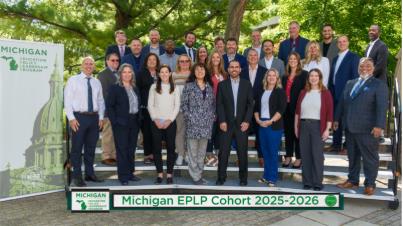
To inaugurate the 2025-26 Michigan EPLP year, the program’s co-coordinators, including Dr. Bryan Beverly, Dr. John Lane, and Tyler Thur, hosted the Fellows for an all-day orientation on Monday, September 8th, at the Kellogg Center on MSU’s campus. Centrally, this kick-off event was focused on developing rapport across the cohort and ensuring that participants felt part of a professional learning community where they could collectively dig into challenging topics. To this end, each Michigan EPLP Fellow introduced themselves, their organization, and their personal and professional goals to the rest of the cohort; the group worked through an extended icebreaker that had them construct human billboards summarizing their backgrounds, core values, and life experiences; and the Michigan EPLP team of coordinators provided an overview of the program’s components, norms, expectations, and history. Beyond preparing the ground for learning, this session dedicated some time to the program’s core themes. First, in terms of Michigan EPLP’s policy focus, the Fellows heard from Dr. Madeline Mavrogordato, Director of the Education Policy Innovation Collaborative (EPIC) and MSU Professor of K-12 Educational Administration and Policy, and Dr. Tara Kilbride, EPIC Associate Director, on this entity’s teacher shortage study and benchmark assessments report. More than just sharing the data in these publications, Drs. Mavrogordato and Kilbride helped the Michigan EPLP cohort consider the importance of research in the policymaking process and how the Fellows might support the development of high-quality insights for legislators via their poster projects and Learning Team presentations. Second, regarding the program’s emphasis on leadership and networking, the group discussed effective networking strategies based on their past experiences, considered best practices from Leadership Networking: Connect, Collaborate, Create, and mapped their professional networks.

Later in the month, Michigan EPLP held its second 2025-26 session. This meeting, hosted on Monday, September 22nd, prioritized the program’s emphasis on developing impactful leaders in the education space in three respects. First, it included a presentation from Dr. Bryan Beverly, Director of the Office of K-12 Outreach and Michigan EPLP Co-Coordinator, and Dr. Tara Kintz, Outreach Specialist in the Office of K-12 Outreach, on the Myers-Briggs Type Indicator (MBTI) and how this instrument can help Fellows better understand their leadership preferences. Through facilitated self-assessment, various reflection activities connected to the different MBTI dichotomies, the dissemination of insights related to this tool, and a large group visualization of how Fellows have some similar leadership styles and other divergent leadership proclivities, Drs. Beverly and Kintz gave the attendees space to consider what efficacious leadership entails, inventory the cohort’s strengths, and identify some places for growth over the rest of the program year. Second, this Michigan EPLP session dug into leadership by investigating how leaders respond to conflict. To support this goal, Dr. John Lane, Outreach Specialist in the Office of K-12 Outreach and Michigan EPLP Co-Coordinator, walked Fellows through the Thomas-Kilmann Conflict Mode Instrument, guided reflection on the many possible conflict styles, and helped the cohort consider the ways that diverse preferences can align for productive outcomes. Finally, to help bridge this session’s prioritization of leadership with future meetings’ contemplation of policy, Tyler Thur, Associate Director of Data & Evaluation for the Office of K-12 Outreach and Michigan EPLP Co-Coordinator, emphasized how Fellows can serve as policy entrepreneurs who drive change and shared a host of resources through which program participants can track education policy happenings.

Also in September, the Office of K-12 Outreach kicked off its participation in the 2025-26 Advanced Education Policy Leadership Program (AEPLP). Since the 2021-22 school year, this multi-state initiative has brought together EPFP/EPLP alums for a deeper consideration of education policy, leadership, and networking following Fellows’ initial engagement with state-specific programs. In particular, it helps Fellows apply past policy learning and professional experiences to specific education controversies, and it offers a deeper emphasis on Fellows' capacity for strategic leadership. This year, the 2025-26 AEPLP cohort includes 30 Fellows and 10 coordinators from Kansas-Missouri, Michigan, Minnesota, New York, Ohio, and Pennsylvania, all focused on “Strategic Leadership in the Midst of Chaos.” Concerning AEPLP-related efforts this month, the Office of K-12 Outreach supported a Michigan-specific launch with Fellows from the Michigan Department of Education, the Michigan Education Association, Teach for America – Detroit, and the Macomb Intermediate School District on Wednesday, September 10th. During this virtual session, the Fellows reconnected with program leaders and one another, considered what learning priorities they would prioritize during the 2025-26 year, reviewed the program structure, and discussed emerging state and federal policy debates. Second, the Michigan Fellows traveled with EPLP and AEPLP Co-Coordinator Tyler Thur to our nation’s capital for an introductory DC Symposium on Thursday, September 18th, and Friday, September 19th. There, the program’s approximately 40 Fellows and coordinators heard from Congressional staffers, registered lobbyists, education journalists, association leaders, and practitioners in K-12 and higher education spaces on topics including emerging legislative issues, post-Trump DEI policy, education lobbying, and conditional funding as an increasingly popular policy strategy. They also worked through various protocols to develop rapport across the cohort and begin dissolving barriers across states and organizational types to support policy diffusion and the sharing of best practices from policy experimentation in extremely diverse contexts.

Lastly, concerning the Office of K-12 Outreach’s policy work, September saw the launch of the MSU-BMEA Policy Modules as part of the BMEA Principal Wellness & Policy Fellowship. Previously, BMEA had supported a collection of Fellows in the Michigan Education Policy Leadership Program – then Michigan EPFP. Wanting to expand the breadth of their offerings and customize the policy content offered to their Fellows, BMEA worked with the Michigan EPLP Co-Coordinators this summer to develop a series of policy learning experiences for their Fellows – K-12 principals who seek “balance, support, and community,” who are “ready to center wellness in their leadership,” and “who want to engage in meaningful education policy work” (BMEA). Relatedly, on Saturday, September 13th, EPLP and AEPLP Co-Coordinator Tyler Thur joined the opening retreat for the BMEA Principal Wellness & Policy Fellowship in Port Huron. During a two-hour session, he helped program participants identify their motivations for engaging in education policymaking and advocacy, supported the group’s generation of a collective definition of policy and their review of experiences with policy on a daily basis, explained how these modules would structure learning around the various stages of the policy cycle, shared some essential policy resources for practitioners, and updated attendees on the latest state and federal education policy happenings. With that, the presentation set up BMEA participants for a year of related growth through these sessions and their own policy projects, involving the generation of policy recommendations on a topic of personal and professional interest.
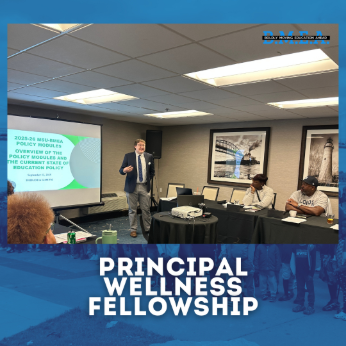
Looking ahead, while September saw significant work concerning the 2025-26 EPLP, AEPLP, and MSU-BMEA Policy Modules, there is so much more in store for program participants over the next few months. Concerning the 2025-26 EPLP Fellows, the group will continue their learning in October at the 2025 Regional Leadership Forum in Pennsylvania, where they will identify leadership lessons from Gettysburg and curriculum at the U.S. Army War College. Regarding the 2025-26 AEPLP cohort, the Michigan Fellows will continue their learning on Thursday, October 16th, during a virtual session hosted by the New York AEPLP coordinators and Fellows, which will seek to answer the question of “what is the purpose of public education?” Finally, the BMEA Fellows will gather next with K-12 Outreach representatives on Saturday, November 15th, to dig into key education policy actors and how principals can influence every stage of the policy cycle. As these program years develop, readers interested in Fellows’ growth and accomplishments can follow Michigan EPLP on social media and keep an eye out for future editions of In Focus. For instance, the October newsletter will cover reflections from next month’s Regional Leadership Forum for Michigan EPLP Fellows. Further, folks with questions or who are interested in participating in any of these offerings in future years can visit the Michigan EPLP website or contact a Michigan EPLP Co-Coordinator.
